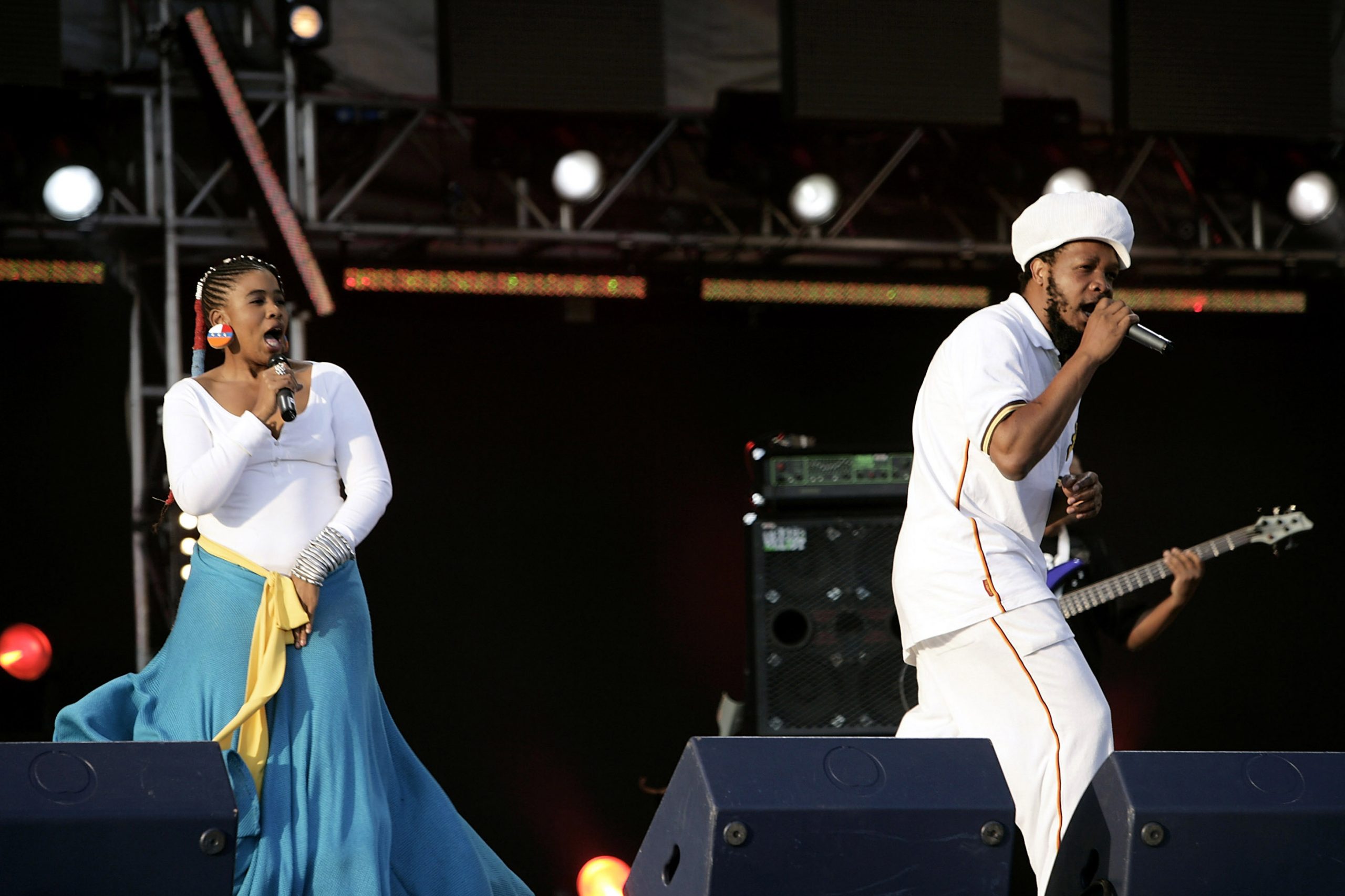Review | From Bongo With Love by Bongo Maffin
Despite a hiatus of more than a decade, Bongo Maffin has released an incendiary new album full of fresh sounds, tough political questions and odes to love and life.
Author:
17 December 2019

“This is Radio Freedom broadcasting live and dangerous from the underground,” announces Bongo Maffin’s seventh studio album and their first in 14 years, From Bongo With Love, in an ode to radio’s role in Africa’s liberation movements.
The album is an urgent call to address the loose ends of the post-apartheid era and the gross inequality that has left many impoverished and in dire need. In the spirit of subversive radio, the album appears to offer a different truth, a counter-message to the mainstream idea that freedom has been won.
This approach to music has a history. In 2010, Freshlyground’s Radio Africa positioned itself as an alternative broadcaster of an often-hidden reality of inequality and kleptocracy post-independence. Songs such as Big Man featuring Les Nubians and Chicken to Change (which opens with the swearing-in of Robert Mugabe as president after Zimbabwe gained its independence) speak to how leaders have lost their credibility as icons of change.
Radio Africa highlights the crisis of leadership on the continent in which you have a working class with no work and liberation movements that morphed into political parties while abandoning the ideals that launched them. From Bongo With Love picks up where Radio Africa left off and responds to recent incidents of femicide and xenophobia, particularly in South Africa.
The politics of radio
The radio can weaponise political influence. In the 1930s, Radio Zeesen, a Nazi-sympathising station, was introduced to South Africa and Namibia before World War II, as Lebona Mosia, Charles Riddle and Jim Zaffiro write in From Revolutionary to Regime Radio: Three Decades of Nationalist Broadcasting in Southern Africa. This was countered by the British Broadcasting Corporation broadcasting anti-Nazi content in Afrikaans.
“As colonialism was rolled back to South Africa, an increasing number of African states joined the radio war against apartheid [which was designed to model Nazi Germany following the formation of the DF Malan-led National Party in the 1930s, when white opinion was split between Nazi and British supporters], South Africa’s presence in Namibia and the rebel white-minority regime in Rhodesia [Zimbabwe],” they write.
Frantz Fanon’s A Dying Colonialism details the ways Algeria’s National Liberation Front – like other anti-colonial movements in Egypt and Tunisia – turned to radio as a means of countering the settler states’ anti-liberation propaganda.
Related article:
A number of African states extended their services to the ANC’s Radio Freedom in the 1970s, allowing for the station to broadcast from exile, as historian Sekibakiba Peter Lekgoathi writes in The ANC’s Radio Freedom, Its Audiences and the Struggle Against Apartheid in South Africa, 1963-1991. This connected South Africans to the liberation movement outside its borders. The station was one of the mediums through which the ANC called on the masses to render South Africa ungovernable at the height of resistance in the 1980s. And it was through this station that many banned songs from the likes of Hugh Masekela could be played uncensored.
The station was a platform for political education and the honouring of fallen activists murdered by the apartheid regime, including, for instance, the Maseru Massacre on 9 December 1982. Members of Radio Freedom helped train the founders of Bush Radio, Africa’s oldest community radio based in Cape Town. In April this year, equipment used to broadcast Radio Freedom from Madagascar was repatriated to the Freedom Park Museum.
Archival call to the present
In From Bongo With Love, the line, “Daughter of the soil, how long you’ve toiled while thieves run away with the spoils,” belted out by Thandiswa Mazwai, highlights the often-erased contribution black women made to sustaining liberation movements while men were in exile or incarcerated.
We also hear this in Mama Winnie, which opens with a clip from Ichikowitz Foundation documentary Winnie Madikizela-Mandela: In Her Own Words in which she describes her experience of interrogation and solitary confinement between May 1969 and September 1970.
The album is an archival project. Bongo Maffin have used the album to cement their place in a lineage of artists who reflect the times and are giving listeners the tools to make sense of our context by drawing from history’s resisters, from Zimbabwe’s Mbuya Nehanda to Madikizela-Mandela. They purposefully centre women.
This project is a soundscape that attempts to unbundle us from an allegiance to imposed Berlin Conference borders and helps us imagine a different continent. With powerful and diverse vocal textures and tone colours from both Mazwai and fellow band member Speedy, call and response phrases, motswako – courtesy of Stoan Seate – and dancehall riddims brought to us by reggae legend Jah Seed, the gang is pretty much all there, and the original group that brought us Ndiphendule and Thathi Sgubhu is finally complete.
A return
Until now, it was difficult to imagine the band’s return given how much South Africa’s music has changed over the years. Bongo Maffin’s previous album, New Construction (2005), debuted at a time when kwaito’s dominance had waned, when Afropop, which threw back to Sophiatown, was the dominant sound for artists outside of house music. In the past decade, hip-hop has entrenched its place in South African music alongside different dance sounds such as amapiano.
Related article:
It’s rare for artists to maintain longevity in a fast-changing musical landscape. Just last year, the biggest sound was gqom with Distruction Boyz at the forefront and Babes Wodumo touted as the future of mainstream South African music. Today, amapiano rules the airwaves with few gqom musicians successfully crossing over.
It doesn’t seem to end well for artists or groups who try to make a return to music after a hiatus as long as Bongo Maffin’s. Iconic groups such as New Edition or Boyzone don’t quite attract the same appeal on return as they did when they were at their peak. It is a different thing for a group to reunite for one more tour or festival. In such instances, concerts become a time capsule transporting listeners back to the moment they heard the beat drop on a classic, as adult fans of the Spice Girls attested when the iconic band reunited for their 20th anniversary or when Thebe performed Ungawa Kum at Afropunk in 2017.
But the sound of From Bongo With Love is in step with the latest trends in the mainstream, proof that as much as they were out of the spotlight as a collective, the group was clearly studying the scene. This album feels as though they never left.
Whereas previous offerings saw a collision of kwaito, reggae and Afropop, with sprinklings of other influences, including R&B, From Bongo With Love is a display of a vast musical palate, from dancehall riddims to kwaito, gqom and house. The group does not allocate a genre to a specific track as artists tend to do, but instead offers a considered fusion of sounds. For instance, kwaito anchors Mafatshe while a kora is plucked over the baseline.
Love, amid grief and horror
Nestled in between politics is the theme of love, living and thriving in a time of inexplicable grief and horror. The past few months have seen numerous reports of South African women raped and murdered, of xenophobic attacks and, recently, the death of Anele Hoyana at the hands of the racist Fritz Joubert. The songs Gimme Love, Vuma, Rofo Rofo and Huya Huya are odes not only to those of us bombarded with these horror stories but also to our parents, who lived through the brutality meted out by the National Party and who still managed to dance to Brenda Fassie’s Weekend Special, among other bubblegum hits of the 1980s.
Love and politics segue from one track to the next, proving that living and resisting aren’t mutually exclusive. The music touts some of the influential ideas that helped usher in African liberation. It is difficult not to think of the rousing speeches and writing of African intellectuals Robert Sobukwe, Thomas Sankara and Amílcar Cabral, when the songs Best of Me or One Africa blares from the speakers.
The album makes the realisation of true African emancipation a matter of urgency. After all, Bongo Maffin are from a generation of artists who raged against the supposed “new South Africa”. Their discography features a slew of tracks that address Africa’s unfinished business and the individual requirement to emancipate one’s mind as though in conversation with Bob Marley.
From Bongo With Love is a gentle but stern reminder that freedom centred only on race and ending cosmetic segregation over gender, class and structural injustice is no longer satisfactory.


